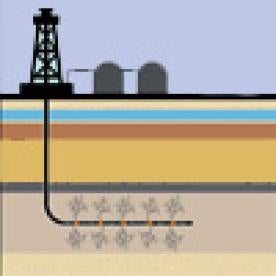On 2 November 2019, the UK government announced that it is ending its support for fracking in England. This follows a report from the UK’s Oil and Gas Authority (OGA), an independent subsidiary of the UK’s Department for Business, Energy and Industrial Strategy (BEIS), which found that it is not currently possible to accurately predict the likelihood or magnitude of earthquakes linked to fracking operations.
Fracking (also known as hydraulic fracturing) is a mining technique which involves injecting water, chemicals, and sand underground at high pressure to fracture shale rock and release trapped oil and gas. While common in the United States, the use of fracking in the UK has to-date been limited.
The OGA’s report, while based on an assessment of fracking operations undertaken at Preston New Road in Lancashire (one of the UK’s very few active fracking sites), made a number of general findings including that the “methods for predicting [earthquake magnitude] need further testing and cannot be viewed as reliable”. The report noted further that “methods for predicting the maximum magnitude [of earthquakes] that adopt a link between [the volume of injected materials] and the maximum magnitude of induced [earthquakes] lack convincing empirical evidence or proven theoretical basis”.
Fracking operations at Preston New Road have been suspended since a magnitude 2.9 earthquake was recorded there on 26 August. More broadly, Scotland suspended fracking in 2015, the Welsh government imposed a moratorium in 2015, and Northern Ireland has a planning presumption against fracking (although the technique is not subject to a formal moratorium there).
While widely reported as the government having ‘banned’ fracking in England, the government’s recent announcement only provides that fracking is paused until “further evidence is provided that it can be carried out safely”. Although applications for permission to undertake fracking may still be made – and the government has stated that they will be considered on their merits – the announcement provides that “the shale gas industry should take the government’s position into account when considering new developments”. Therefore, while any new fracking applications would appear futile, the resumption of fracking in England cannot be ruled out entirely.
The announcement does nonetheless represent a significant U-turn for the government. As we discussed in a post on the GT London Law Blog in 2014, the government (then also a UK Conservative Party administration) had previously been in favour of expanding fracking. The then-Minister of State for Energy, Matt Hancock, stated that he would like to see companies able to start operating fracking sites within six months of submitting applications.
Nevertheless, even when the industry had the government’s support, obtaining the necessary permission to operate a fracking site in England was a challenging and time-consuming process. There are several competent regulatory authorities and a large number of permits, consents, and approvals needed to be obtained. The government’s guidance intended to help operators understand the regulatory process highlights the breadth of what was required:
a petroleum exploration and development licence;
a lease or other access rights from the landowner;
petroleum operations notifications;
an effective operational and environmental management system;
planning permission from the local minerals planning authority;
a permit from the Coal Authority if the well would encroach on coal seams;
notification to the British Geological Survey;
the completion of consultation processes with all statutory/relevant consultees;
any necessary environment permits;
notification to the Health and Safety Executive (HSE);
the provision of the proposed well design to HSE;
the agreement of data-reporting methods and monitoring with BEIS; and
a Hydraulic Fracturing Consent from BEIS.
Fracking was also subject to significant, albeit often localised, public opposition, including in relation to operations at the Preston New Road site. It is for this reason, coupled with the government’s previous support for fracking, that some commentators have suggested the government’s recent announcement is based, at least in part, on the fact that the UK will hold a national election on 12 December in which fracking could have (without the moratorium) emerged as a key issue in several constituencies. If such suspicions are correct, then the moratorium on fracking may – depending on who forms the next government – be relatively short-lived.
However, the OGA’s report comes to different conclusions than those reached in a 2012 joint report by the Royal Society (RS) and the Royal Academy of Engineering (RAE) commissioned by the UK’s then-Chief Scientific Advisor. That report, Shale gas extraction in the UK: a review of hydraulic fracturing, identified the risks from seismic activity resulting from fracking to be low (provided a number of stated recommendations were followed). Given that the 2012 RS/RAE report had been relied upon by the government in connection with the safety of fracking operations, but that its findings must now be seen as questionable following the OGA report, any future reversal of the moratorium decision for England would appear to require an authoritative new assessment of the seismic risks from fracking and a clear conclusion that those risks can be managed.
A decision to reverse the moratorium taken without such an assessment would be at risk of being challenged in the courts. As a result, the moratorium on fracking in England may be set to stay in place for some time.



 i
i


